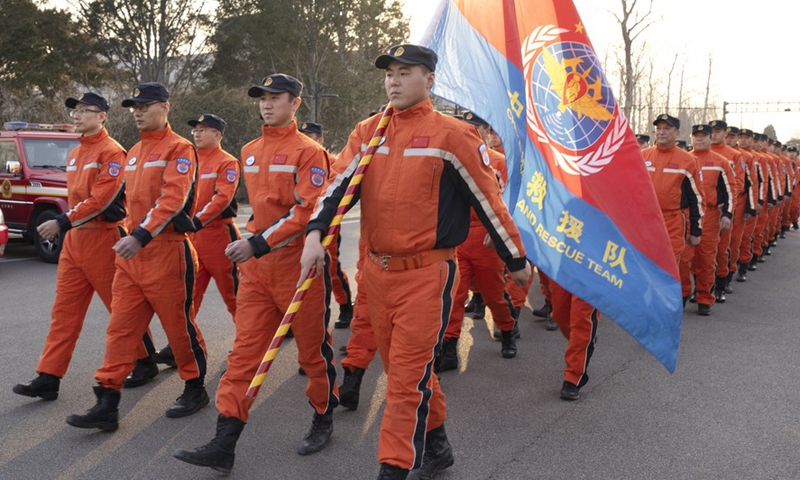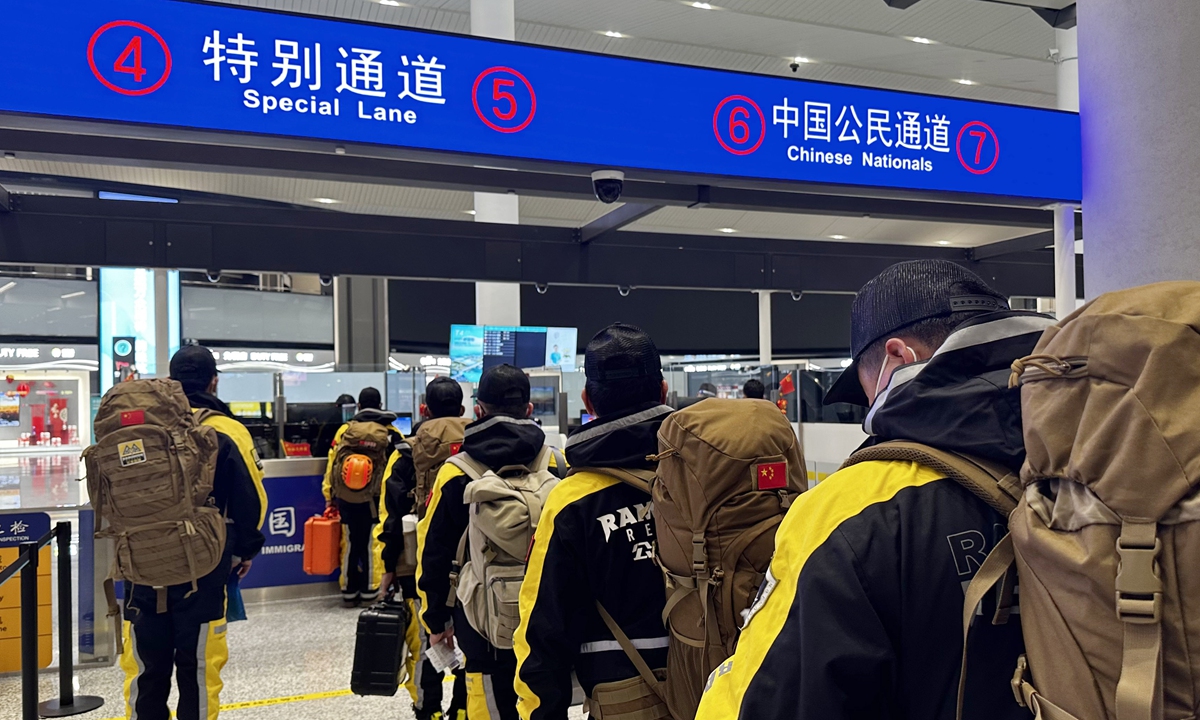
An aerial view shows collapsed buildings in Hatay, Turkey on February 7, 2023 after a 7.8-magnitude earthquake and strong aftershocks jolted Turkey and neighboring Syria the previous day. More than 5,000 were killed and more were injured as of press time. Photo: VCG
China on Tuesday announced its first batch of 40 million yuan ($5.9 million) of emergency assistance to Turkey, and that it would dispatch rescue teams to help save lives and provide assistance to Syria.
As of press time, the death toll has topped 5,000 and many others remained trapped under debris after the initial 7.8-magnitude earthquake, a 7.5-magnitude tremor and a string of powerful aftershocks jolted parts of Turkey and Syria on Monday and Tuesday. The death toll is likely to increase as thousands of buildings were toppled and cold and snowy weather may shorten the time needed to save lives, media reported.
World leaders have expressed concerns over the deadly earthquakes. "My heart goes out to the people of Turkey and Syria in this hour of tragedy," said UN Secretary-General Antonio Guterres in a statement. "The United Nations is fully committed to supporting the response. Our teams are on the ground assessing the needs and providing assistance."
Chinese President Xi Jinping on Monday
sent messages of condolence respectively to Turkish President Recep Tayyip Erdogan and Syrian President Bashar al-Assad over the tragic earthquakes in the two countries.
Chinese Foreign Minister Qin Gang expressed deep condolences to Turkish Foreign Minister Mevlut Cavusoglu on Monday.
Erdogan also announced a three-month state of emergency across 10 provinces on Tuesday.
Deng Boqing, vice chairman of the China International Development Cooperation Agency (CIDCA), said in an interview that Chinese government immediately activated its emergency humanitarian assistance mechanism to provide emergency aid to Turkey and Syria.

A Chinese rescue team departs from Beijing for Turkey on a chartered plane on Feb.7, 2023 to join earthquake relief efforts in the country. Photo: Xinhua
China's Ministry of Emergency Management sent an 82-strong rescue team with equipment and supplies to Turkey. The team departed from Beijing around 4 pm on Tuesday, Xinhua reported.
Turkey Embassy to China later thanked the rescuers and wished them safe on Twitter-like Weibo.
Other rescue teams from China have gone to Turkey.
A civilian rescue team named Ramunion from Hangzhou, consisting of eight members and a rescue dog, is expected to arrive in Turkey on Wednesday.
The Global Times learned from the team on Tuesday that it has taken advanced equipment, such as radar life detector for buried victims, as well as other equipment for search and rescue. The team is the first Chinese civilian assistance team sent to Turkey, and they are expected to be operating in the most damaged area.
Wang Ke, director general of the Pinglan Public Welfare Fund, told the Global Times on Tuesday that after the disaster, the fund immediately contacted Turkish and Syrian governments through their embassies in China to send an application to participate in the rescue mission.
Wang said that as soon as they get permission, they will send a team of up to 10 people to each country, and after preliminary assessments, they will send more teams.
In addition to China, many countries had announced to send rescue personnel and supplies to Turkey and Syria. Planes carrying aid shipments from Iraq and Iran arrived at Damascus International Airport on Tuesday, Turkish and Syrian media reported.
The World Health Organization (WHO) has authorized emergency medical teams to provide care to the injured and most vulnerable populations, WHO chief Tedros Adhanom Ghebreyesus said in a tweet.
"As part of the United Nations family, the UN Development Program [UNDP] stands ready to support affected people in the coming days, weeks and months as they recover from this tragedy," UNDP Administrator Achim Steiner said in a statement.
Analysts called for more international aid to Turkey and Syria, especially when the hardest-hit areas in Turkey are underdeveloped and northwest Syria has 4.1 million people relying on humanitarian assistance, mostly women and children. Aside from sending rescue personnel, future assistance efforts could focus on medical care for the injured, the restoration of infrastructure for basic needs of water, power and transportation, and building shelters for people who have lost their homes.

A civilian rescue team named Ramunion from Hangzhou, East China's Zhejiang Province consisting of eight members and a rescue dog, departs for Turkey on February 7, 2022. Photo: VCG
More help neededThe earthquakes happened in the East Anatolian Fault Zone at the intersection of the Anatolian Plate with the Arabian Plate and the African Plate, which means high possibility of aftershocks of high-magnitude, Wang Tun, head of the Institute of Care-life, a key earthquake early warning laboratory in Chengdu, Southwest China's Sichuan Province, told the Global Times.
How to ensure the safety of rescue workers operating under the risk of strong aftershocks is a major concern, Wang said.
The Global Times learned from some Turkish people living in different regions in the country that the epicenter is densely populated. Infrastructure, especially roads and airports, suffered huge damage, which adds to the difficulty of searching for survivors.
In northern Syria's Aleppo and Idlib, thousands of buildings, including two hospitals, collapsed due to the earthquake. Millions of Syrians have been displaced by the long-running war in northern Syria, which poses huge humanitarian needs, media reported.
Chinese nationals in Turkey have volunteered to help with disaster relief, and the first shipment of relief materials including tents, sleeping bags and blankets are expected to be distributed on Tuesday.
Zhang Junyue, a vice president of the general chamber of commerce of Chinese enterprises in Turkey, told the Global Times on Tuesday that enterprises and employees known to the organization have been evacuated from the epicenter.
Due to the huge losses by the earthquake, "the power and the water supply in the earthquake-hit regions have been cut off, and the network doesn't work well," Zhang said. Chinese nationals in Turkey have been working together to provide assistance to people in need.
The direct impact of the earthquake to some Chinese companies with projects or branch offices situated in the central and western part of Turkey are so far limited, the Global Times learned on Tuesday afternoon.
One branch company of PowerChina based in Istanbul, which is situated relatively far away from the center of the earthquake, said that they did not feel the heavy earthquake and everything was normal so far.
Several employees of another Chinese branch company based in Aksaray in central Turkey said that they felt the heavy shake on the ground but there have been no knowledge regarding any casualties or house collapsing in the place where the project is located.
"Seeing residents crying in the earthquake reminds me of the Wenchuan earthquake [taking place in Sichuan in 2008]. We feel heartbroken and want to do something to help the Turkish people," Wang Ke said.
He noted that after the Wenchuan earthquake China has advanced rapidly in establishing a world-leading earthquake early warning system and is willing to work with more countries on earthquake resistance and disaster prevention.






